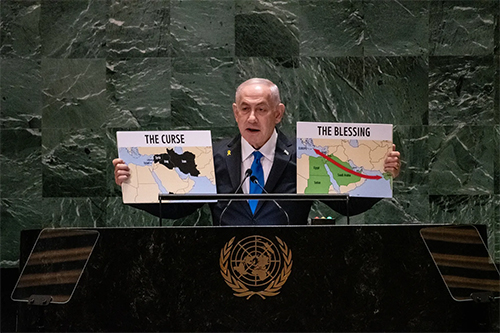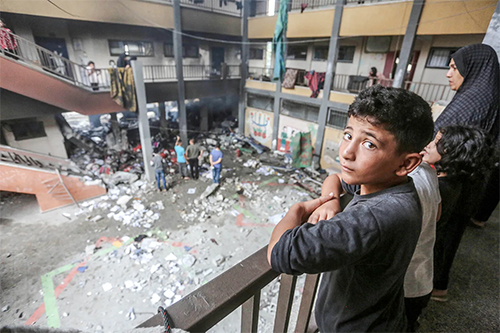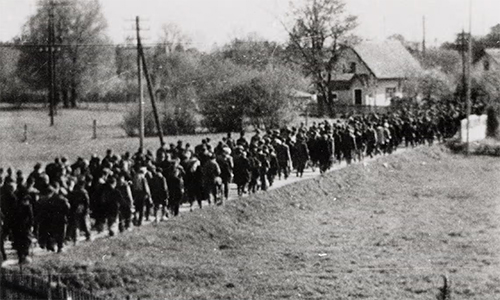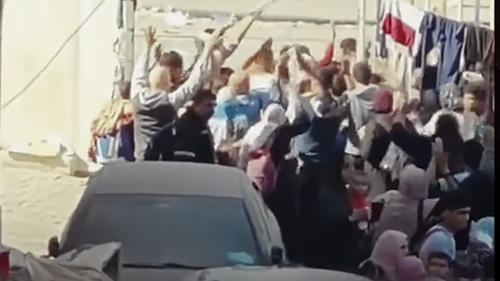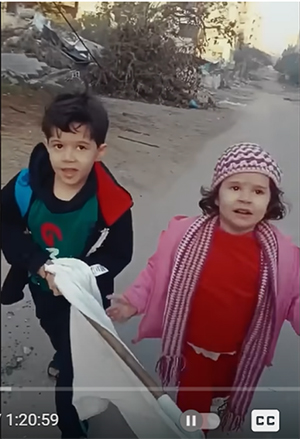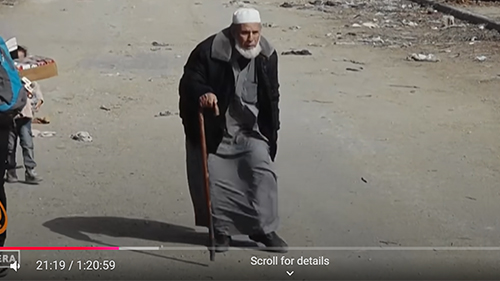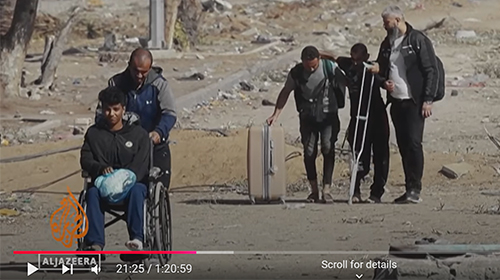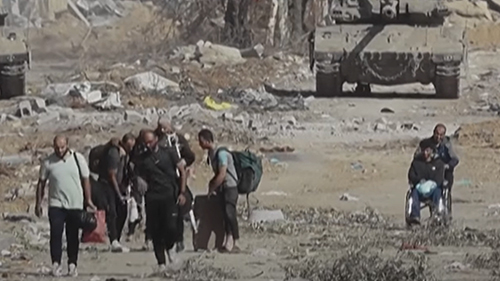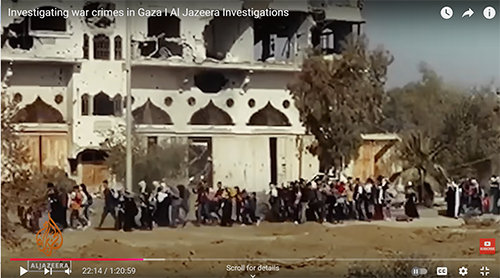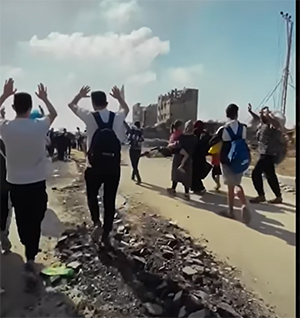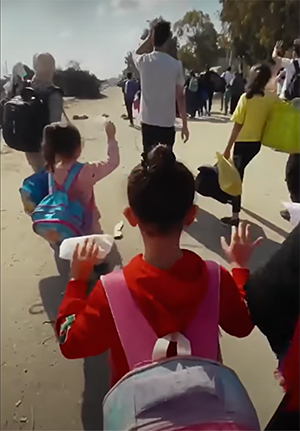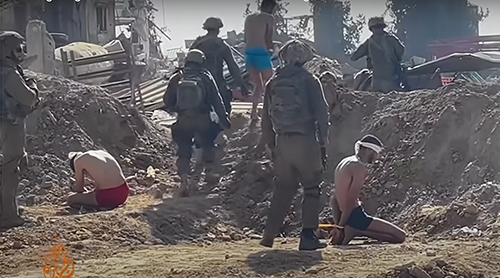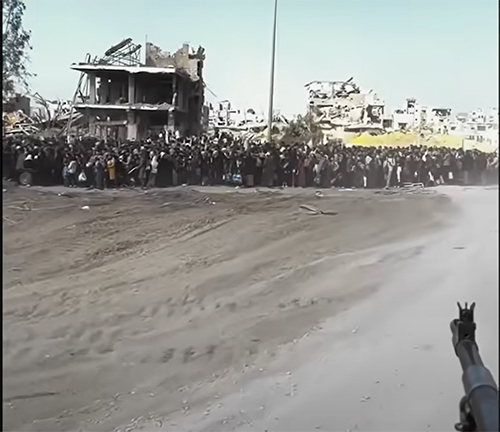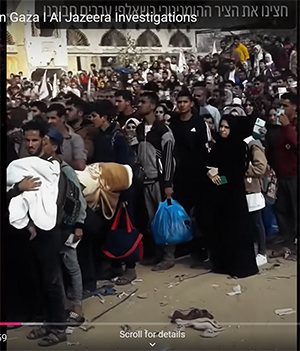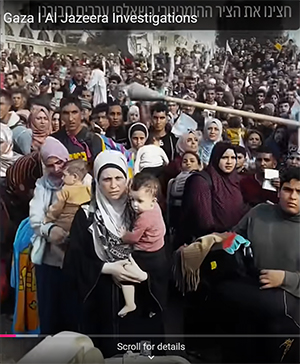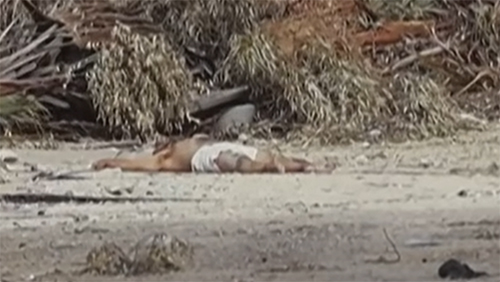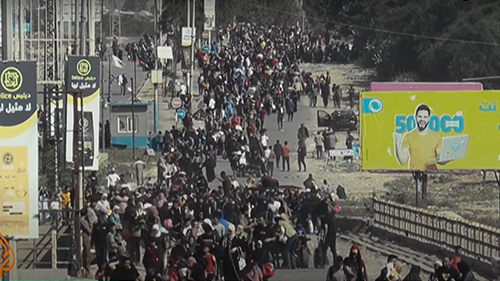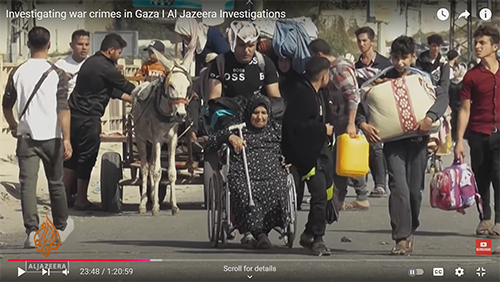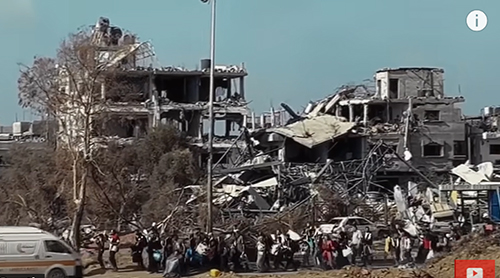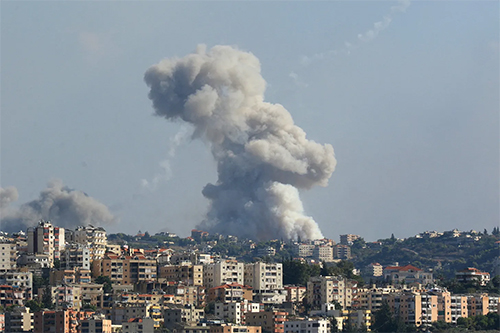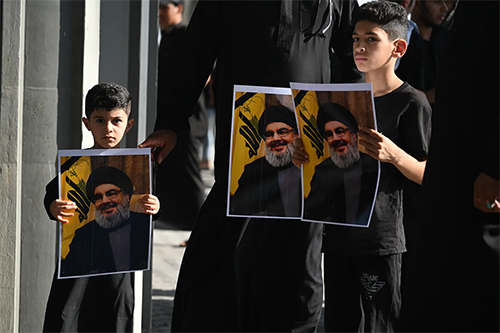Headlinesby Amy Goodman
DemocracyNow!
October 17, 2024
Israel Kills at Least 25 in Jabaliya U.N. Shelter as It Tightens Its Chokehold on Northern GazaOct 17, 2024
Israel’s two-week siege on northern Gaza continues. Rescue workers say dozens of bodies remain buried under collapsed buildings in Jabaliya, where Israeli strikes earlier today on a U.N.-run school sheltering displaced Palestinians killed at least 25 people, including children. Hospitals warn food and fuel is running out. Dr. Hussam Abu Safiya, director of Kamal Adwan Hospital, recorded this video late last night.
Dr. Hussam Abu Safiya: “The nursery is full of cases. They are critical cases in nature. This baby here was only a few hours old when his mother was targeted right after giving birth, so his mother, father and grandmother were martyred. This baby is now alone and has an injury to his head, which led to a secondary infection, and now he is receiving the needed treatment.”
U.S. Ambassador to U.N. Claims U.S. Will Hold Israel Accountable If It Starves PalestiniansOct 17, 2024
At the U.N. Security Council Wednesday, U.S. Ambassador Linda Thomas-Greenfield suggested the U.S. would start to demand evidence from Israel it is not intentionally starving Palestinians.
Linda Thomas-Greenfield: “A policy of starvation in northern Gaza would be horrific and unacceptable and would have implications under international law and U.S. law. The government of Israel has said that this is not their policy, that food and other essential supplies will not be cut off. And we will be watching to see that Israel’s actions on the ground match this statement.”
This comes as a new report by Politico reveals a top Biden administration official told aid groups in late August that the U.S. would not restrict arms and funding to Israel, even if Israel blocked food and other aid from entering Gaza. Lise Grande, Biden’s special envoy for Middle East humanitarian issues, reportedly told the heads of over a dozen aid groups the U.S. would never “hold anything back that [Israel] wants.”
Inside Gaza, Palestinians say Israel’s deliberate, man-made famine has been evident for months. This is Karam Safi, a displaced Palestinian in Khan Younis who has been working with aid groups to provide food to up to 16,000 people.
Karam Safi: “Due to the closure of the aid crossings and the permanent siege of the north and south, we were compelled to distribute these lentils, and with very simple resources and capabilities so that we can serve these people. … I expect a very big catastrophe. A very big catastrophe. I mean of a special kind. Why? Because most of the adults and children will die of hunger. And the Israelis are doing this intentionally. They are carrying out this siege to kill the people one way or another, not by strikes, but by famine. The goal is to humiliate the Palestinian people.”
Meanwhile, UNRWA, which has been defunded by the U.S. since January, is warning it may soon no longer be able to function.
Philippe Lazzarini: “And I will not hide the fact that we might reach a point that we won’t be able anymore to operate. And if we cannot operate anymore in Gaza, it’s not just UNRWA as the main provider of services, but you have also the rest of the U.N. system, which very much relies and depends on the platform that the agency has offered so far. So, we are very near to a possible breaking point. When would it be? I don’t know. But we are very near of that.”
Israel Expands Assault on Lebanon, Attacks Beqaa in East, Compounding Displacement CrisisOct 17, 2024
Israeli airstrikes have hit eastern Lebanon’s Beqaa Valley shortly after Israeli forces warned residents it will attack the region. Before the latest warning, 25% of Lebanon was already under forced evacuation orders from Israel. Meanwhile, the U.N. Interim Force in Lebanon reports its peacekeepers have once again come under “direct and apparently deliberate fire” in southern Lebanon. We’ll go to Beirut to speak to journalist Rania Abouzeid after headlines.
Meanwhile, Syrian media reports at least two people were injured when Israel launched an airstrike on the port city of Latakia.
*******
“The Gaza Playbook”: Israel Brings Displacement, Death and Destruction to Lebanonby Amy Goodman
DemocracyNow!
October 17, 2024
https://www.democracynow.org/2024/10/17 ... transcriptWe get an update on Israel’s war on Lebanon from journalist Rania Abouzeid in Beirut. “We are seeing a definite escalation that started a month ago and doesn’t show any sign of letting up,” she observes, describing unrestrained attacks by Israel throughout the country, on all sectors of society, as Israel carries out its “Dahiya doctrine” in an attempt to foment division among the Lebanese population. “This is the Gaza playbook. … The sentiment here is that this is now a war on Lebanon,” Abouzeid says.
TranscriptThis is a rush transcript. Copy may not be in its final form.
NERMEEN SHAIKH: We begin today’s show in Lebanon. The United Nations says Israel’s war on Lebanon has displaced 1.2 million people, including 400,000 Lebanese children. Earlier today, the Israeli military attacked the Beqaa region in eastern Lebanon after ordering more people to flee their homes.
This comes as the death toll from Israel’s attack on a municipal building in the city of Nabatieh has risen to at least 16. Lebanese officials denounced the attack, which killed the city’s mayor and five other city workers who were holding a meeting to discuss distributing aid in the region.
Meanwhile, the U.N. says its peacekeeping forces in Lebanon came under, quote, “direct and apparently deliberate fire” from an Israeli tank on Wednesday. The tank fire damaged a U.N. watchtower and destroyed two cameras.
In other developments, video has emerged of Israel blowing up a historic neighborhood in the Lebanese village of Muhajbib. On Wednesday, U.S. State Department spokesperson Matthew Miller was questioned about the attack by Matt Lee of the Associated Press.
MATT LEE: I want to go just to Lebanon for a second, because there was this footage that appeared, I guess overnight, of Israel blowing up an entire village in southern Lebanon. What do you make of that?
MATTHEW MILLER: So, I’ve seen the footage. I cannot speak to what their intent was or what they were trying to accomplish, what their targets were. I don’t know what they were. Obviously, we do not want to see entire villages destroyed. We don’t want to see civilian homes destroyed. We don’t want to see civilian buildings destroyed. We understand that Hezbollah does operate at times from underneath civilian homes, inside civilian homes. We’ve seen footage that has emerged over the course of the past two weeks of rockets and other military weapons held in civilian homes. So, Israel does have a right to go after those legitimate targets, but they need to do so in a way that protects civilian infrastructure, protects civilians.
MATT LEE: All right. I’m not sure I understand “I cannot speak to what their intent was or what they were trying to accomplish.” Isn’t it pretty clear that they —
MATTHEW MILLER: So —
MATT LEE: — what they were – what their intent was and what their —
MATTHEW MILLER: So — so —
MATT LEE: Whether they had a specific target in mind or not, blowing up an entire village, that seems to be pretty self-revelatory.
MATTHEW MILLER: So, I don’t — I don’t know what was in those buildings. I don’t know what was potentially underneath those buildings. That’s why I said I can’t speak to what they were trying to accomplish.
NERMEEN SHAIKH: That was U.S. State Department spokesperson Matthew Miller being questioned by Matt Lee of the Associated Press.
Well, we go now to Beirut, where we’re joined by Rania Abouzeid. She’s a Lebanese Australian journalist and author based in Beirut. Her new piece for The New Yorker is titled “War Comes to Beirut.”
Rania, welcome back to Democracy Now! If you could respond to the latest news, the places and the scale of the Israeli airstrikes in Lebanon?
RANIA ABOUZEID: Well, actually, a month ago today, the war in the south became the war in Lebanon with Israel’s mass detonation of thousands of pagers across the country. And that was followed the next day with a similar triggering of explosives in walkie-talkies. And it heralded an escalation that continues to this day. So, Israeli attacks have been ramped up in terms of the scope of the attacks, in terms of the frequency, the geographical location and also the targeting.
You mentioned in your intro the attack yesterday on Nabatieh’s municipal building. Now, Nabatieh is a provincial capital in southern Lebanon. The Israelis had earlier called on its residents to evacuate. Some were unable or unwilling to. And the local councilmembers, some of them, including the mayor, stayed behind to provide aid, bread, to distribute bread to those people, and they were killed.
Just in this past week, you know, we have seen airstrikes on homes that have been sheltering displaced people. This week, there was an attack on a house in northern Lebanon, which is the opposite end of the country from the Israeli border, and it killed more than 20 people. So we are seeing a definite escalation that started a month ago and doesn’t show any sign of letting up.
AMY GOODMAN: And, Rania, if you can talk about Israel saying they are only targeting Hezbollah? Talk about the map of who is getting bombed. And also talk about what Hezbollah is responsible for, not only a military wing.
RANIA ABOUZEID: Yes, no, Hezbollah is not only a military wing. It is also a political party. It has members of Parliament, more than a dozen of them. It has ministers in this government and certainly in governments over many years past. It has a very vigorous and active social services arm, which includes first responders. They have also come under attack by the Israelis, and many of them have been killed. So, it’s a multi-armed organization which is an integral part of Lebanon’s social and political and military fabric.
In terms of the victims of these Israeli strikes, I mean, I can tell you that the death tolls, the daily death tolls, are in the double digits. And most of those people who are killed are women and children. In that attack in northern Lebanon that I mentioned, there was an 80-year-old woman who was killed, along with two babies. So, it’s not just going after Hezbollah. We’ve heard this before. We’ve heard this in Gaza, that they’re only going after Hamas. And it’s the same thing that we’re hearing here. I mean, yesterday, as you mentioned also in your intro, Israeli troops rigged an entire village in southern Lebanon which is very close to the border, and they blew it up. This is the Gaza playbook.
NERMEEN SHAIKH: You are in Beirut. For your latest piece for The New Yorker, you’ve been speaking to people who have been displaced. There are tens of thousands. If you could tell us what they were saying and what the situation in Beirut is as more and more people are displaced from areas around Lebanon?
RANIA ABOUZEID: Well, first of all, the Israeli drones don’t seem to leave the air. They don’t seem to leave the skies over Beirut. And they’re not just over the southern suburbs, which is where Hezbollah had offices and a presence. It’s everywhere, across the city. It is this incessant buzzing.
The displaced are being housed in more than a thousand facilities across the country, including more than 700 schools and educational facilities. There are also many people who are still on the streets. Just yesterday, I was with a group of hundreds of displaced people who are in an area very close to the coast, to the Lebanese coast, in an area called Biel. And they’re staying — I can’t even call them tents, because the four sides were completely open to the elements. It was just a piece of canvas overhead. And these people are displaced from all over Lebanon, not just from the south. They were displaced from the southern suburbs of Beirut, an area known as Dahiyeh, and as well as the Beqaa, which has also come under bombardment, and elsewhere. There were Syrians among them, too.
So, yes, the government has opened more than a thousand shelters, but it’s not enough, given the sheer volume of people who have been displaced. Many have also been taken in by Lebanese into their homes. And that is why some of these houses — you know, we’ve seen some of these displaced people who were taken in by Lebanese in other parts of the country — come under Israeli attack.
AMY GOODMAN: And, Rania, if you could talk about the number of people you spoke to who consider themselves anti-Hezbollah? How are they feeling now?
RANIA ABOUZEID: Well, it’s definitely — the sentiment here is that this is now a war on Lebanon and that there is no safe space. When Christian villages in the north and in the south can also be targeted, there is a sense that you just don’t know who Hezbollah — sorry, who Israel is targeting. They claim that they are chasing Hezbollah operatives. Who knows? There are question marks about that. Is there any proof of that? Like yesterday, when they blew up the village in the south, they said that there were Hezbollah tunnels under this. You know, they seem — again, this is part of the Gaza playbook. They can say that there is a command center, Hamas command center, under one of the hospitals and blow it up.
So, there is a sense that, you know, there are certainly Lebanese who disagree with Hezbollah’s decision to open what it called a support front to ease the pressure of Gaza. That was how Hezbollah described its support front. There are Lebanese who disagree with that. There are Lebanese who blame Hezbollah for dragging — for, they say, dragging the country into the war. And there are many others who see Hezbollah as the frontline defense against Israeli not only airstrikes and attacks, but also there have been attempts over the past two-and-a-half weeks or so for Israeli ground troops to enter southern Lebanon. And they have faced very fierce resistance from Hezbollah fighters in the south.
NERMEEN SHAIKH: Well, if you could respond, Rania, to what Netanyahu has said about Israel’s intentions in Lebanon? He said that the Lebanese basically need to eliminate Hezbollah. Unless people of Lebanon, he says, quote, “take the country back” and free themselves from Hezbollah, Lebanon would be turned into Gaza. I mean, your response? People are saying, suggesting that what he wants, what Israel really wants, is to instigate a civil war in Lebanon. Is that the general sentiment?
RANIA ABOUZEID: That is the general sentiment, and that is a sentiment that was conveyed from some of the country’s top politicians down to some of these displaced people who are still on the streets of Beirut. That is very — I mean, that’s how it was interpreted, that he’s basically saying, “Turn on each other, or we will turn you into Gaza.”
And, you know, we see these efforts to try and foment this suspicion among Lebanese. There are — in all of those cases that I mentioned, when displaced people who were taken into homes in other parts — and let me be frank, in non-Shiite areas of Lebanon, were targeted by the Israelis, there is this sense that the Israelis are trying to make Lebanese fear each other, to try and make people of the south almost outcasts and to make people afraid to take in the displaced into their homes and into their communities.
This is compounded by the fact that in recent days Israeli journalists just casually tweet something, saying, “Hey, you know, what’s happening in a garden in a particular neighborhood?” And that causes widespread panic, when the Lebanese fear that perhaps that garden — they’re saying that because that garden or that facility might be targeted. Just before we went on air, there was a report that the Al Jazeera offices in central Beirut have also received a similar warning and that they have now been evacuated. So, there is this panic and this sense Israel can target whatever it wants, whenever it wants, and that they’re — with complete immunity.
AMY GOODMAN: Your response also to Prime Minister Netanyahu, Rania, saying that he’s demanding UNIFIL soldiers get out of combat zones, alleging their presence is providing a human shield for Hezbollah? And overall, talk about the significance of saying that the peacekeepers — I think there are about 10,000 of them in southern Lebanon — should get out of the way, many saying they want them — that Israel wants them out because they don’t want international observers describing what’s happening there. But how UNIFIL is seen in Lebanon?
RANIA ABOUZEID: Well, I’ll tell you how UNIFIL has responded to those threats. And UNIFIL has said that they’re not going anywhere. UNIFIL is the peacekeeping force that is stationed along the U.N.-delineated Blue Line, which is the border between the two states. It is their role to stay there and to monitor what is happening there.
We’ve seen four, I think five, attacks now, direct Israeli attacks on UNIFIL bases. They have wounded peacekeepers. They have taken out surveillance cameras on some of these bases. They’ve also, on one occasion, actually used a bulldozer to try and bring down a wall on one of these UNIFIL bases.
So, it’s all part of this effort to sort of intimidate and to attempt to discredit not just UNIFIL, but the U.N. We’ve seen the same thing with UNRWA, which is the U.N. agency which is tasked with dealing with Palestinian refugees. Beyond that, I mean, we saw Netanyahu himself at the U.N. General Assembly stand on the podium there and call the U.N. antisemitic. Israel has declared the U.N. secretary-general persona non grata in Israel. So, it’s all part of this coordinated effort to try and discredit the U.N. if it points out things like international law and the laws of war and international humanitarian law, and, in fact, UNIFIL’s mission and why it is in southern Lebanon.
NERMEEN SHAIKH: Rania, could you explain, you know, this idea, this doctrine, the Dahiya doctrine, and whether — which is named, of course, after the area outside Beirut which has come under fire from Israel, and whether you think that’s actually in effect now? And I just want to just quote a brief passage from your New Yorker piece where you point out — I mean, just to give a scale — a sense of the scale of Israel’s assault, you know, a number of health workers have been killed, health facilities targeted. You quote Airwars, a British conflict monitor, who told The Washington Post that Israel’s offensive in Lebanon was, quote, “the most intense aerial campaign that we know of in the last 20 years” — of course, with the exception of Gaza. So, if you could explain the Dahiya doctrine and your sense of whether it’s in effect now?
RANIA ABOUZEID: Well, the Dahiya doctrine was created, basically, after the 2006 war. And to put it very bluntly, the idea is that you cause so much pain to a community that you try and pry public support from the group, from the nonstate actor — in this case, Hezbollah. So, the idea is that you inflict so much pain on Hezbollah’s support base, on what is known here as the resistance community, that it turns against the group.
And this is why we’re seeing, you know, the scope of the targets is so wide. It is not just — you know, Israelis are not just targeting Hezbollah infrastructure and military targets. They are also targeting, as I said, people, displaced people who escaped parts of the country that are very far away from the border. They’re targeting — Lebanon’s public health minister has said that he — you know, there are hospitals that have been bombed and closed their doors because of the threat of Israeli strikes. More than a hundred paramedics have been killed. Medical centers have been targeted. So, it is a very — the targeting is very broad.
And the idea is to try and, as I said, pry that support, to say — actually, Hezbollah’s deputy secretary general, Sheikh Naim Qassem, said this, not in his last speech, which was a few days ago, but in the one before that. He said this is the war about who screams first. So, it’s about inflicting pain on the other side and who is going to say “enough” first. And the Dahiya doctrine thinks that if you inflict enough pain on Hezbollah supporters, you will pry them away from the party.
NERMEEN SHAIKH: Rania Abouzeid is a Lebanese Australian journalist and author based in Beirut. Thank you so much for joining us. We’ll link to your piece for The New Yorker, “War Comes to Beirut.”
RANIA ABOUZEID: Thank you.
NERMEEN SHAIKH: Coming up, as aid groups warn Israel is wiping northern Gaza off the map, the Biden administration is threatening to cut military assistance to Israel in 30 days if more aid is not allowed into the area. We’ll speak to former State Department official Josh Paul, who resigned in protest last year. Back in a minute.
*************
Ex-State Dept. Official: Israel Is Starving Gaza Now. We Can’t Wait Another 30 Days to Take Actionby Amy Goodman
DemocracyNow!
October 17, 2024
https://www.democracynow.org/2024/10/17 ... transcriptAid groups warn Israel is wiping northern Gaza off the map, and the Biden administration is threatening to cut military assistance to Israel — but not for at least 30 days. This comes as the U.S. has continued to arm Israel despite findings by its own experts at USAID and the State Department that Israel has routinely impeded delivery of food and medicine to Gaza. We speak with Josh Paul, a former State Department official who resigned last October over the push to increase arms sales to Israel. He and Tariq Habash, who resigned in protest from the Education Department, have launched a lobbying organization and a political action committee called A New Policy to push for a new approach on Israel/Palestine amid what Paul calls a “deep-rooted and very entrenched” pro-Israel consensus in U.S. politics.
TranscriptThis is a rush transcript. Copy may not be in its final form.
NERMEEN SHAIKH: This is Democracy Now!, democracynow.org, The War and Peace Report. I’m Nermeen Shaikh in New York, with Amy Goodman in Washington, D.C.
“Northern Gaza is being wiped off the map.” That’s the warning from Oxfam and 35 other humanitarian groups who say Israel’s siege on northern Gaza has reached a, quote, “horrifying level of atrocity.”
Earlier today, Israel’s military bombed an UNRWA school in Jabaliya housing hundreds of displaced Palestinian families. Al Jazeera reports the death toll from the attack has climbed to 25, with many children among the dead.
As Israel continues its siege on northern Gaza, U.S. Secretary of State Antony Blinken and Defense Secretary Lloyd Austin sent Israeli Prime Minister Benjamin Netanyahu a letter Sunday threatening to cut off U.S. military assistance if Israel does not boost humanitarian aid access to Gaza within the next 30 days. The Biden administration has continued to arm Israel despite findings by its own experts at USAID and the State Department that Israel has routinely impeded delivery of food and medicine to Gaza in violation of U.S. law.
Politico has revealed that in August, Biden’s special envoy for Middle East humanitarian issues, Lise Grande, met with leaders of more than a dozen aid organizations and directly said the U.S. would not suspend arms to Israel. One person who attended the meeting told Politico, quote, “She was saying that the rules don’t apply to Israel.” Grande also reportedly said the United States will not, quote, “hold anything back that they want.”
We are joined now by Josh Paul. He’s a former veteran State Department official who resigned in protest of the push to increase arms sales to Israel amid its assault on Gaza. He’s a former director in the Bureau of Political-Military Affairs in the State Department. On Wednesday, he and Tariq Habash, who resigned in protest from the Education Department, announced the formation of a new lobbying organization and a political action committee called A New Policy to push for Washington to take a new approach on Israel/Palestine.
Josh Paul, welcome back to Democracy Now! We’ll talk about this new organization and the PAC that you’ve formed, but first if you could respond to the letter that Austin and Blinken sent to Netanyahu, what it said and what it means that they gave Israel 30 days? Of course, in 30 days, that’s after the U.S. elections will take place and a new administration will be in power.
JOSH PAUL: Yes. Thank you, Amy. And good to join you this morning.
So, I want to clarify, to begin with, that the letter that Biden — sorry, that Blinken and Austin sent to their counterpart in the Israeli government didn’t actually threaten to cut off arms or to suspend security assistance. It simply said that there could be consequences under National Security Memorandum 20 and under U.S. law. What those consequences are, I think, remains to be seen, if at all. We have seen repeated expressions of concern from the United States government over the course of the last year.
And yet, what this letter makes clear, in its detail — and it is a detailed letter. It lists, I believe, 15 steps the United States would like to see Israel take to facilitate the entry of humanitarian assistance into Gaza. What it does by doing so is demonstrate that the U.S. is currently in breach of its own laws. U.S. law says the U.S. cannot provide security or any form of assistance to a country that is restricting the delivery of U.S.-funded humanitarian assistance. Here we have, in writing from this administration, a list of the ways in which Israel is doing so, and yet U.S. military assistance continues to flow.
And, of course, nowhere in the law does it say, you know, “Give them 30 days to see if they can fix it.” The law is very clear that when it is made known to the president that assistance is being restricted, U.S. assistance cannot be provided. So, I think that there is, you know, plenty of reasons for skepticism here. And, of course, while people are starving on a daily basis in Gaza, dying of malnutrition, the time for this to be fixed is now. The time for it to be fixed was actually almost a year ago, but it is certainly now, not in 30 days.
AMY GOODMAN: So, Josh Paul, if you can talk — although you left the State Department protesting U.S. policy on Israel, and you were the person who approved weapons sales within the State Department, you clearly still have contacts within the State Department. Can you talk about what people are saying? I mean, everything from the revelations of ProPublica, also us speaking to other people who quit over reports coming out of the State Department saying clearly Israel is cutting — preventing humanitarian aid from coming in, and yet Blinken turns these reports around. What people are saying? Are there more resignations within the State Department? And what the U.S. accomplishes, since Netanyahu is such a clear ally of Trump and wants him to win, yet Biden still embraces him, supports him, and even with this warning letter, as you said, you know, the election will happen by the time they were to cut off aid if Israel doesn’t comply with what the U.S. is demanding?
JOSH PAUL: Yes. That last part, in particular, has been a bit of a mystery to me and, I think, lots of other people, because it has been very clear that Prime Minister Netanyahu has long had a preference for the Republican Party and for President Trump. He made that clear again when he came to Washington. He has made that clear in running rings around President Biden repeatedly over the course of the last year. So, what the thinking there is on the part of Democratic strategists, I just can’t fathom.
You know, with regard to how things are playing out within the State Department, it’s actually been a year to the day since I handed in my resignation at the State Department. And, you know, there was a significant increase in dissent, in protest within the department in the initial months of this conflict. I think the challenge is that none of that really led to any policy, because what we — or, policy changes, because what we have is a very tightly controlled set of decisions that are being made on a very political and politicized basis from the very top levels of the U.S. government.
You noted that within the State Department, there has been increasing transparency and pushes from USAID, the U.S. Agency for International Development, and from, for example, the Bureau of Population, Refugees, and Migration, to submit to Secretary Blinken evidence that Israel is restricting U.S.-funded humanitarian assistance. I think it is worth noting that when ProPublica’s piece came out two weeks ago, reporting that these reports had gone to Secretary Blinken and he had cast them aside, those reports also — that report also noted that one of those officials, Julieta Valls Noyes, assistant secretary for population, refugees, and migration, had been asked if she felt that Section 620I of the law, that says we cannot provide assistance in these circumstances, had been triggered, her initial response was “Yes.” When she was pressed, she backed down. I think it’s worth noting that she quietly resigned a week ago, shortly after the ProPublica story came out.
So, I think there is a degree still of concern, and certainly of shame, amongst high-level officials. I know that amongst lower-level officials, there is immense pain. I’ve heard from people in the last week saying they don’t know if they can do this any longer. At the same time, I think there’s also a feeling of desperation and that there’s really nothing, under President Biden, that can be done or can be changed from the inside on this issue. So people are waiting to see what happens next and what happens after the election.
AMY GOODMAN: And do you see, from your vantage point as an insider, any space between Biden and Harris?
JOSH PAUL: I think that’s very hard to say. Certainly, Vice President Harris, as a candidate, has not given us much evidence that there is any space. On the contrary, she has said repeatedly that she will continue the policies set by President Biden, including of unconditional support for Israel. There are people around Vice President Harris. Her policy team are, I think, different than those around Biden. And I think, as well, that Harris is not the ideologue on this issue that President Biden is. But I do think that what we face here is a deep-rooted and very entrenched set of political, economic incentives that will make it very hard for anyone to change U.S. policy in this regard, regardless of the outcome of the election, or of this election. This is something that is going to take a long time to resolve and a lot of effort.
And to get to the point that you opened our session with, that’s why Tariq Habash and I and a group of extraordinary, remarkable leaders, including former U.S. Ambassador to Syria Robert Ford, have created A New Policy. This is a lobbying organization and a political action committee founded on the idea that what we face here is actually not a policy problem. We know what the policy problems are. The people in government know what the policy problems are. What we face here is a political problem. And until we fix the politics, until we play within this ugly system that we have to make it work in the interests of the American voters, the American people, American values, and the interests of all of the people in the region, we are not going to make headway. So, that is what we are out to do.
NERMEEN SHAIKH: And, Josh Paul, if you could also respond to recent reports that suggest that Israel will launch retaliatory strikes against Iran within the next three weeks — that is to say, before the U.S. election? And although the Biden administration has reportedly won assurances from Israel that they will not attack Iranian nuclear or oil sites, of course, the implications of this would be enormous. If you could respond to that and how you think the Biden administration would respond in the event that Israel does attack Iran?
JOSH PAUL: Well, so, let’s, first of all, remember that the Biden administration also won assurances from Israel back in April that it would conduct itself in accordance with international humanitarian law and not restrict the flow of humanitarian assistance in Gaza. So, I’m not sure how much assurances from Israel at this point are worth or how credibly they can be taken.
That said, I think that one of the things that is empowering Prime Minister Netanyahu in this situation is his knowledge that America has Israel’s back, that no matter what Israel does — you know, we have deployed now a Terminal High Altitude Area Defense system, a THAAD system, which is our most capable and most expensive air defense system, to Israel. We have deployed several squadrons of U.S. fighter jets. We have deployed U.S. Navy ships. And I think that the problem there is that we create for Prime Minister Netanyahu this ability to escalate without concern over repercussions, and indeed, if anything, a certain attraction, one can imagine, to him of getting America involved in a conflict with Iran that he has long craved. So I think these are indeed very dangerous times, particularly as we lead into a U.S. election here.
AMY GOODMAN: Finally, Josh, A New Policy, the name of your new organization — A New Policy’s website says the United States policy in the Middle East should comply with American laws, reflect American values, advance peace, and peace and prosperity for all Americans. Are you saying now that the U.S. is breaking U.S. law?
JOSH PAUL: So, not only am I saying that the U.S. is breaking U.S. law, but I’ve actually heard, as have others who I’m working with, from members of Congress, behind closed doors, who will say, “We believe that what Israel is doing with our weapons amounts to war crimes, but we won’t say that publicly.” What A New Policy’s mission ultimately is, as Tariq Habash said today in the magazine Semafor, is to change that, is to fix that, is to make it so that U.S. elected officials can vote in accordance with their voters’ preferences, with their constituents’ interests, with American interests, with American values and with American law. We need to remove these structural roadblocks and these financial, frankly, roadblocks to our democracy and to the enforcement of our laws. So, if all of your listeners or viewers would like to visit, we are at
www.anewpolicy.org, and happy to continue the conversation there, as well.
NERMEEN SHAIKH: Thanks so much, Josh Paul, former director in the Bureau of Political-Military Affairs in the State Department. He resigned in protest last year. He has just launched a lobbying group called A New Policy.” Thanks so much for joining us.
Coming up, we’ll look at Israel’s threats to launch retaliatory strikes against Iran as fears grow of a broader regional war.
****
“Itching for a War”: Biden Deploys U.S. Troops to Israel as Netanyahu Threatens Escalation with Iranby Amy Goodman
DemocracyNow!
October 17, 2024
https://www.democracynow.org/2024/10/17 ... transcriptWe look at Israel’s threats to launch retaliatory strikes against Iran as fears grow of a broader regional war. We speak to analyst Trita Parsi, executive vice president of the Quincy Institute for Responsible Statecraft, about the Biden administration sending U.S. troops and the top-of-the-line THAAD missile defense system to Israel. “There are no direct and clear U.S. interests at stake here,” says Parsi. “Every time Israel escalates the war, Biden rushes in to protect Israel from the consequences of its own escalation,” incentivizing Israel’s escalation of tensions in the region and risking drawing the U.S. into war with Iran, he adds.
TranscriptThis is a rush transcript. Copy may not be in its final form.
NERMEEN SHAIKH: This is Democracy Now!, democracynow.org, The War and Peace Report. I’m Nermeen Shaikh in New York, with Amy Goodman in Washington, D.C.
We end today’s show looking at the rising risk of a broader regional war in the Middle East. The Pentagon has announced U.S. B-2 bombers attacked five Houthi targets in Yemen earlier today. Defense Secretary Lloyd Austin said the attacks came in response to Houthi’s, quote, “destabilizing behavior.” Houthi fighters have attacked vessels in the Red Sea and the Gulf of Aden since November and vowed to continue until Israel ends its assault on Gaza and Lebanon.
This comes as the Biden administration is deploying an advanced anti-missile defense system and a hundred U.S. troops to Israel as Israel threatens to carry out retaliatory strikes against Iran in response to Iran’s recent ballistic missile attack on Israeli military and security sites.
Earlier today, the commander of Iran’s elite Revolutionary Guards issued a new warning to Israel. The commander, Hossein Salami, was speaking at the funeral of Brigadier General Abbas Nilforoushan, who was killed in the Israeli attack that killed Hezbollah leader Hassan Nasrallah.
HOSSEIN SALAMI: [translated] You, Israel, may imagine that THAADs can compensate for your shortcomings in defending you. This is a mistake. Do not trust the tubes of these launchers. You cannot massacre Muslim nations but remain safe, secure and live in peace. No, that cannot happen.
NERMEEN SHAIKH: We’re joined now by Trita Parsi, executive vice president of the Quincy Institute for Responsible Statecraft. He’s the author of several books, including Losing an Enemy: Obama, Iran, and the Triumph of Diplomacy.
Welcome back to Democracy Now!, Trita. If you could just begin by responding to this latest news?
TRITA PARSI: So, I think it’s extremely important for the American public to understand that what Biden has done here is that he has deployed U.S. troops into an active war zone in another country’s war. There are no direct and clear U.S. interests at stake here. And the Biden administration is essentially presenting this as if it is defending Israel or helping Israel defend itself, whereas, in reality, these are — the distinction between defensive and offensive weapons here is rather irrelevant, because what the Biden administration is doing is reducing the costs for Israel to escalate tensions in the region. Every time Biden does this, it makes it easier for Israel to escalate. And as a result, it has continued to do exactly that.
If Biden was not reducing the costs of escalation, it would have been costlier for Israel to do the steady escalation as we’ve seen in the last year, a widening of the war, and it would have thought twice. Perhaps the costs would even have been prohibitive. So, if the Biden administration’s actual goal is to prevent the widening of the war, prevent escalation in the region, adding defensive or any type of military capabilities to the side that actually is leading the escalation is not something that, in any way, shape or form, actually can help calm the situation down. Instead, it actually helps fuel tensions in the region and increases the likelihood of the very same widening of the war that Biden claims that he is against.
AMY GOODMAN: Can you give us, Trita, a chronology of what happened? The bombing on the inauguration of the new president by Israel of Tehran — not clear if it was an airstrike, if it was a bomb that was planted — that killed the Hamas negotiator, Ismail Haniyeh, then — that was Israel. Iran waits weeks and then attacks with 180 anti-ballistic missiles that kill no one but a Palestinian who died from, not clear, the shrapnel that came down from the sky in Jericho. They said they were just targeting military sites in Israel. Is Iran coordinating, by the way, with the United States, actually, in all of this? Is there more behind-the-scenes communication than we understand?
TRITA PARSI: There is behind-the-scenes communication, undoubtedly. And there is, perhaps at a surfical level, a degree of coordination. I think the Iranians do not want to see escalation, knowing very well that they are in a weaker military position, and they know quite well that Netanyahu has been looking, itching for a war for quite some time, a war that he designs to drag the U.S. into it. And his best opportunity to drag the U.S. into this unnecessary war is in the next three weeks. So, the Iranians have been rather restrained, hoping that they would avoid walking into Israel’s trap.
This is part of the reason why, after the assassination of Haniyeh, despite the fact that they promised a response, they didn’t respond. They claim that there were promises from the U.S. and Europe that there would be a ceasefire and that they waited to give that a chance. No ceasefire came, but on top of that, instead, Israel attacks Lebanon, kills Nasrallah, as well as the senior IRGC official. And after that, the Iranians did decide to respond, and they do so by striking military targets.
And in that strike, they also demonstrate their capacity to penetrate Israel’s air defenses, which is precisely why, when the THAAD is now being deployed over there in Israel — is an indication, is an admission that the Israeli air defenses are insufficient. This, again, goes back to what I said earlier on. Every time Israel escalates the war, Biden rushes in to protect Israel from the consequences of its own escalation. That is not a strategy to prevent escalation; that is a strategy that fuels escalation.
NERMEEN SHAIKH: So, Trita, could we also talk about what role countries in the region could potentially play in any possible retaliation against Iran? The Iranian foreign minister was recently in Riyadh. He’s now in Egypt. But people have spoken specifically about Saudi Arabia and the United Arab Emirates. Israel has been trying to persuade them to, quote, “not facilitate any possible Israeli retaliation.” If you could talk about the relationship between the UAE, Saudi Arabia and Iran, the various sites at which they’ve been at odds, and where they stand at the moment vis-à-vis Iran?
TRITA PARSI: There’s been an interesting evolution of the position of the Saudis and the Emiratis. Fifteen years ago, they were not publicly, but privately, they were lobbying the U.S. quite aggressively to go to war with Iran. This was revealed by the WikiLeaks, in which the cables showed how much very senior officials, including the king of Saudi Arabia at the time, was pushing for the U.S. to go to war. This has now changed in the last couple of years. There’s both been a bit of a rapprochement between these countries, but also a clear realization on the Saudi and the Emirati side that the Iranians actually have capabilities that go far beyond what they had expected, which means that in case of a war, the Iranians would have the capacity of destroying a tremendous amount of facilities in Saudi Arabia and the Emirates, and as a result, those two countries would suffer tremendously in the case of a war, which is something that they previously did not think was the case.
Today, I don’t think they are, in any way, shape or form, eager for this type of a confrontation. And I think the message from the Iranian side to them has been that if they facilitate, if they allow their airspace to be used or their bases to be used for an attack against Iran, the Iranians will also retaliate against them directly. I think that message from the Iranians is sent to them in order for them to put pressure on the Biden administration to actually restrain Israel, something that the Biden administration has been unwilling to do. The Iranians don’t have a direct way of pressuring the Biden administration, but they appear to be calculating that through Saudi Arabia and the UAE, there may be a greater likelihood that the Biden administration finally will do something to prevent the Israelis from further escalation.
AMY GOODMAN: Trita Parsi, according to The Washington Post, Israel is now considering striking military sites in Iran, but not Iran’s oil or nuclear facilities. However, many in the U.S. and Israel are saying, “Take this moment to strike. Take out Iran’s nuclear facilities.” We know, of course, Trump pulled the U.S. out of the Iran nuclear deal that Obama had negotiated. What exactly would this mean, what is about to take place, apparently?
TRITA PARSI: Most military analyses point to the fact that the Israelis actually don’t have the capacity of delivering a fatal blow to Iran’s nuclear facilities. They have been pushing for a larger attack, including against oil installations and economic infrastructure. The Biden administration has pushed back and has essentially delivered a list of military targets that they believe would be adequate for Israel’s response. The Israelis, reportedly, have agreed to this.
But I think it’s very important to understand that most of this is, frankly, meaningless, because once the Israelis strike, particularly if they strike against military sites and try to target military officials, as they have done in Lebanon, there will be civilian casualties. There will be an escalation, that will almost make it inevitable for the Iranians to then respond again, which then means that in the second iteration of this, the Israelis are very likely to go after economic infrastructure, oil installations, and potentially the nuclear program, as well. As long as we are on an escalatory cycle, it does not matter what the first step is. What matters is what the last step is. And as long as we are on that cycle and Biden is not preventing it, it’s, frankly, meaningless if the first step is to avoid targeting nuclear sites and economic infrastructure. This will escalate towards a war in which all of those different things will be targeted, both on the Iranian side, as well as on the Israeli side.
NERMEEN SHAIKH: And, Trita, finally, if you could talk about, respond to the fact that Netanyahu, much like — we spoke about this in our earlier segment on Lebanon — much like as he did with Lebanon, gave a direct address to the Lebanese people? He did the same with Iran last month, saying, “With every passing moment, the Iranian government is bringing the noble Persian people closer to the abyss.” What is the significance of this, and why is he doing that?
TRITA PARSI: Well, he’s done this on previous occasions, as well, not only in the context of Gaza and Lebanon, but in the case of Iran, as well. I think the primary target of this is actually not the Iranian public. The message was in English, and the original video had English subtitles. This is a message to the Western audience in order to present Israel’s war of aggression as a defensive war, as a war that will help get rid of a very unpopular regime in Iran, and as a result, just as with the Iraq War, this deserves the support of the Western publics, because the government in Iran is so problematic, similar to the argument against Saddam Hussein. And remember, it was Netanyahu who testified in Congress back right before the Iraq War promising that an attack on Iraq would have positive reverberations throughout the entire region.
NERMEEN SHAIKH: Thank you, Trita Parsi.
TRITA PARSI: We’re seeing again the Israelis —
NERMEEN SHAIKH: I’m afraid we’re going to have to leave it there. Trita Parsi, executive vice president of the Quincy Institute for Responsible Statecraft and author of several books, including Losing an Enemy: Obama, Iran, and the Triumph of Diplomacy. And that does it for our show. I’m Nermeen Shaikh, with Amy Goodman, for another edition of Democracy Now!
